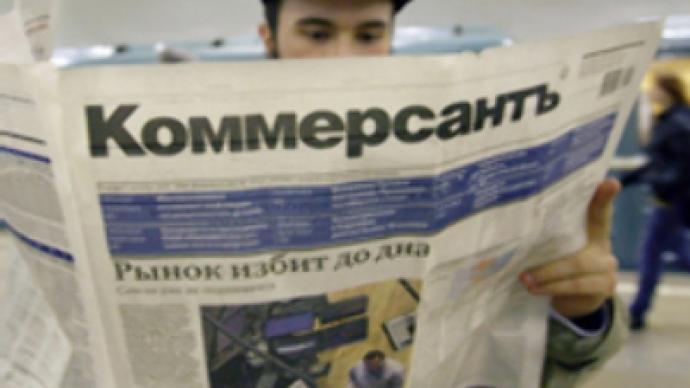Friday's Russian Press Review

This Friday Russian newspapers predict the importance of the next Russia-EU summit, suggest impeaching the UN Secretary General, point a finger at those who triggered the world financial crisis and interview Viktor Bout in a Bangkok jail. Here is the revi
NEZAVISIMAYA GAZETA interviews Xavier Solana, the High Representative of the EU for foreign policy and external security, who says: “Taking into account the global problems we are facing now, there is no acceptable alternative to a strong relationship between the EU and Russia, interaction based on cooperation, dialogue and respect for the supremacy of law.” Nothing to add.
IZVESTIA quotes Dmitry Rogozin, Russia’s Permanent representative at NATO, who discusses the secret agreement signed on September 23 between the UN and NATO without consent from the members of the UN Security Council.
“This document practically makes NATO equal to the UN. NATO is viewed in it as a peacekeeping organisation. It justifies NATO’s actions in Yugoslavia and any other military operations in the present or in the future.”
Rogozin thinks one of the reasons why such a document was signed is the fact that NATO wants to share its imminent failure in Afghanistan with the UN. He says UN Secretary General Ban Ki-moon should be impeached for signing such an agreement.
The same newspaper tries to uncover the very root of the current financial crisis and finally finds it in the same place as all other analysts: in the United States. The paper says the cheap credit introduced by U.S. banks to boost the American economy in the early noughties had a destructive impact on the morale of bankers all over the world.
Everyone decided that everything is possible with cheap credit money flowing in upon the first request, and many non-American banks, including the Russian ones, started borrowing in the U.S. to keep their own loan programmes running smoothly.
When the crisis came, says the paper, it started in America but it hit all the banks and financial companies who had borrowed from U.S. banks. The paper adds that the financial bubbles fueled by cheap American credit were blown further out of proportion by local construction and property development companies, wholesale and retail middlemen in the consumer goods trade and smaller banks that served both industries.
VREMYA NOVOSTEI reports from Washington where Finance Ministers and Central Bank governors of the ‘G7’ are convening their first summit meeting since the beginning of the world financial crisis. The paper quotes the Head of the IMF Dominic Stross-Kann who says that recession is definitely going to follow the crisis shortly and that a slow recovery is going to start only in the second half of 2009.
KOMMERSANT has a column by Sergei Markedonov of the Institute of Political and Military Analysis. He writes that the policy of treating the problems of South Ossetia and Abkhazia as a local conflict, which seems to be the line taken by the Russian government, may prove to be the wrong one in the end. He says Russia needs a certain amount of internationalisation of the problems with Georgia, or it would be harder to legitimise its actions over the attack on Tskhinval in the eyes of the world community.
The same paper has an interview with Viktor Bout, a Russian businessman who is accused by the U.S. of being one of the world’s biggest illegal arms dealers. Bout was arrested in Bangkok in March this year as a result of a U.S. sting operation, released by the Thai side for lack of evidence and arrested again on a U.S. extradition request.
In the interview Bout maintains his innocence, states that he worked only in the air transportation business and only on government contracts. He explains the U.S. interest in him by hinting at events more than ten years ago when he did business, and had friendly relations, with quite a few African leaders and refused several recruitment bids by Western intelligence services.
KOMSOMOLSKAYA PRAVDA has a short opinion piece on Ukraine by Konstantin Zatulin, a member of the State Duma and Director of the Institute of the CIS Countries. He says that president Yushchenko decided to dissolve the Rada with just one purpose: to drag Ukraine into NATO while there is no parliament to oppose and block his decision. That’s why, says Zatulin, Yushchenko went to visit the U.S.last week – he went to seek support from the U.S. and, most probably, gained it.
TRUD writes that in December – January millions of Russians may hear the same phrase from their employers: ‘Happy new year! And, by the way – you are fired!’ The paper says Magnitogorsk Metallurgy Works are ready to announce the first ‘downsizing’ of the current crisis in the real sector of the economy. They are going to fire 3000 workers.
Auto-assembly plants do not tend to fire people, but cut down on working time and wages: no more full-shift work, some models of trucks used in the construction industry out of production for at least a year. Construction companies, says the paper, are not yet shedding jobs but may start very soon, and the same goes for smaller banks and financial companies.
Evgeny Belenkiy, RT












